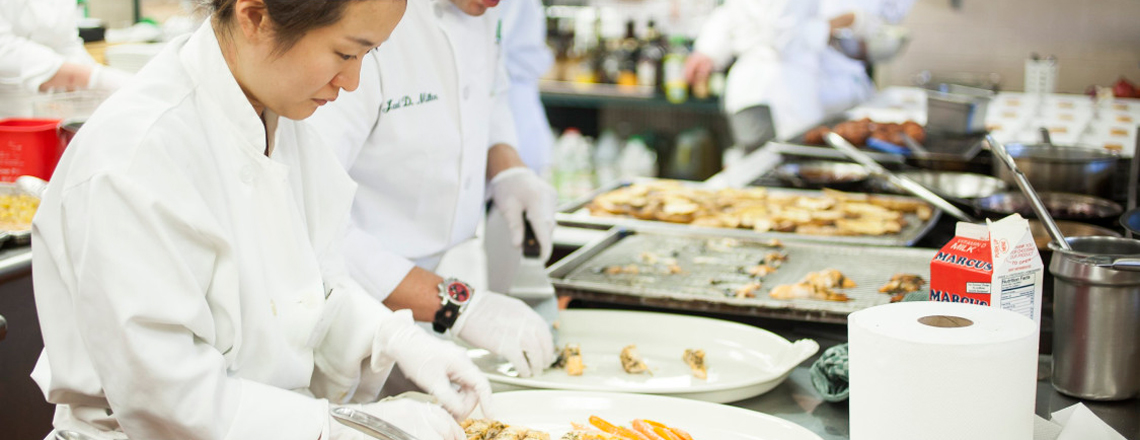News



If You Want to Learn the Business Of Food, the CIA Wants You
National Geographic | Posted: 02/25/2015
View original article here.
Photo Credit: The Culinary Institute of America
[ssba]
Press Release



If You Want to Learn the Business Of Food, the CIA Wants You
Posted: 02/25/2015
DC Chef Brian McBride once said that he—like most chefs—can’t imagine being anything but a chef…but if he had to do it all over again, in addition to cheffing, he would get “a business degree with a minor in accounting.” The food business, it turns out, is a business after all. And the most talented food people need business skills to navigate the at times byzantine and creativity-numbing U.S. venture capital and regulatory food systems with passion intact. (Don’t even get me started on scaling up to international systems.) The prestigious Culinary Institute of America (CIA) has always understood that a heart for food must have a mind for business, for good work and talent to touch as many people as possible. Today, the CIA is announcing the opening of its new branch the Food Business School, with offerings both online and at its Greystone campus in Napa Valley, California. And yes, going to the CIA for a wanna-be chef is the equivalent of going to school at the International Space Station for a wanna-be astronaut. Perhaps most important, many courses are open to the public (e.g., you), people with diverse backgrounds interested in creating a better world through the business of food (and remember, not-for-profit organizations are businesses too), from initial toe-in-pool exploration to chef business education to major companies’ executives’ recommitment of major brands to innovation and good food. The diversity of course offerings—online, in person, and hybrid—allows students to make local changes in their hometowns while benefitting from Greytone’s resources. Investment and interest in food businesses are at an all time high. As I wrote recently, there’s never been a better time to be a food entrepreneur. “We are focused on food entrepreneurship and innovation, helping people transform ideas into successful thriving businesses that deliver healthy, sustainable food to people in a fair and equitable way,” Will Rosenzweig, dean of the Food Business School, told me in an interview. Our discussion ranged in topics from his time creating popup teahouses for his startup Republic of Teain the early 1990s—before “startup” was recognized by spell check and when drinking Starbucks coffee was subversive and just beginning to percolate to the east coast—to food law to how he chooses young businesses as partners (and funding recipients) for his venture capital firm. (A good lean-start-upper, Rosenzweig continues working in his other jobs while at the Food Business School.) “The CIA is culturally a perfect fit for the Food Business School because it wants to be an entrepreneur and innovator itself, educationally,” Rosenzweig notes. Courses will be offered on three tracks—Online Courses (coming this summer), Innovation Intensives (registration opens today), and the Venture Innovation Program (coming early 2016). According to Rosenzweig, online courses will provide affordable introductory classes introducing the food system’s big ideas and challenges, such as hunger, obesity, and animal welfare. The courses will encourage rethinking a student’s role in the food system, whether the student is a corporate executive or entrepreneurially food curious. “Today’s successful entrepreneurs are systems thinkers and systems orchestrators who connect disparate parts of the food system to create new solutions. Plus students will develop their moral compasses in the food industry with case-based scenarios making difficult decisions.” The courses will use a new, to-be-announced interactive platform for highly active student participation (so don’t plan on eating soup and watching “Captain America 2” during class). For students already in the food industry who can visit California, the CIA offers 3- and 4-day structured workshops called Innovation Intensives. Students escape to the CIA’s Greystone Campus in Napa Valley to get out of their normal surroundings, which, Rosenzweig says, “are not conducive to innovation.” Each student leaves with a tangible “deliverable” (a business-school term if ever there were one. A chef’s whole job is “deliverables,” so there will be some basic definition of terms to do here, as if the chef were speaking to a bunch of CEOs aboutquenelling ice cream.) These Innovation Intensives are divided into four groups, each devoted to different themes and held on separate dates. For chefs, “Pop-Up Your Restaurant” focuses on the vexing issues behind opening a restaurant and, equally important, keeping it open. This one speaks to Chef McBride’s point about a chef’s need for a business degree, and chefs are encouraged to bring their investors or business partners if they have them. The ‘deliverable’ here will be a business plan—crucial for any chef looking for startup funds. “Scale Up Your Authentic Food Business” is for food artisans who want to sell more without the product losing soul or quality (having done this with Republic of Tea, Rosenzweig will teach part of this course). “Food Experience Design” offers insight into telling stories about a food brand through platforms like social media. “From Concept to Shelf” is a crash course in dreaming up and quickly bringing new products to market, especially important because, strangely, the companies with some of the dullest food cultures in this country are the large companies that make food. Third, opening for registration this summer, is the Venture Innovation Program, a multi-month in-person and on-line hybrid “for serious entrepreneurs and innovators working to rapidly and rigorously transform good ideas into great food businesses.” The Food Business School will offer this course in early 2016. “A few years ago, the CIA was seeing that a majority of its graduates wanted to start companies and not restaurants, that they wanted to be trained chefs but not in the restaurant industry,” says Rosenzweig. Not unwise—being a restaurant chef can have all of the backbreaking hours of being a corporate lawyer, without any of the salary. The Food Business School was born of wanting to serve these chefs. Food classes at general-interest universities are a big trend, but the CIA believes it has a particular ability to address the expolsive interest and investment in food businesses. “The Food Business School a confluence of my professional life, one part food entrepreneurship; one part education, which I’ve been doing for 15 years; and one part growing companies, which I’ve been doing for 12 years in the venture capital world.” Rosenzweig drew on his extensive Rolodex from all three sectors to create his Fantasy Business League of pedagogues and practitioners (to have both in one program is invaluable in any setting), is including Neil Grimmer, Sarah Soule, and Michael Chiarello (himself a CIA alum). With graduates like Grant Achatz and Charlie Palmer, the CIA brings class to the sometimes-crass startup world. “The faculty is excited to be involved,” says Rosenzweig. “There is no better way to learn then to teach something and there is no better antidote to cynicism than to be with other smart, passionate people.” The food world is a lot bigger and broader than it was even just 10 years ago. With business schools overcrowding the world with MBAs who dream of becoming chefs, the world needs alternative ways of training people who want to learn and grow with one foot still firmly planted in the business world. Plus students get to forever put on their resumes that they went to the CIA. I’m just saying.[ssba]



